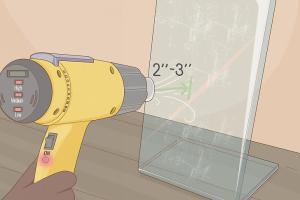Ultimate Guide: How to Effectively Remove Plexiglass Scratches

-
Quick Links:
- Understanding Plexiglass
- Common Causes of Scratches
- Why Remove Scratches?
- Tools and Materials Needed
- Step-by-Step Guide to Remove Scratches
- Case Studies
- Expert Insights
- FAQs
Understanding Plexiglass
Plexiglass, also known as acrylic glass, is a versatile material widely used in various applications due to its clarity, lightweight, and shatter-resistant properties. Unlike traditional glass, plexiglass can be easier to shape and mold, making it a popular choice for both commercial and residential projects.
Common Causes of Scratches
Despite its durability, plexiglass is susceptible to scratching. Common culprits include:
- Improper cleaning: Using abrasive cloths or harsh cleaners can lead to scratches.
- Environmental factors: Dust, sand, and other debris can scratch the surface when they come into contact.
- Accidental impacts: Dropping objects or bumping into the plexiglass can cause scratches.
Why Remove Scratches?
Removing scratches from plexiglass is essential for several reasons:
- Aesthetic appeal: Scratches can detract from the overall appearance of your plexiglass surfaces.
- Visibility: Scratched plexiglass can obstruct light and visibility, which is crucial for applications like aquariums or display cases.
- Longevity: Keeping your plexiglass scratch-free can prolong its life and maintain its functionality.
Tools and Materials Needed
Before starting the scratch removal process, gather the following tools and materials:
- Plexiglass cleaner or mild soap
- Microfiber cloths
- Fine-grit sandpaper (1200 to 1500 grit)
- Acrylic polish or scratch remover
- Soft buffing pad or buffing wheel
- Water (for wet sanding)
Step-by-Step Guide to Remove Scratches
Follow these detailed steps to remove scratches effectively:
Step 1: Clean the Plexiglass
Start by cleaning the plexiglass surface with a dedicated plexiglass cleaner or a mixture of mild soap and water. Use a microfiber cloth to avoid further scratching while removing dust and debris.
Step 2: Assess the Scratches
Examine the depth and extent of the scratches. Light scratches can often be polished out, while deeper scratches may require more aggressive techniques.
Step 3: Wet Sanding (If Necessary)
If scratches are deep, consider wet sanding. Wet the fine-grit sandpaper and gently sand the scratched area in a circular motion. Keep the surface wet to minimize further scratching.
Step 4: Apply Acrylic Polish
After sanding, apply a small amount of acrylic polish to the scratched area. Use a soft buffing pad or buffing wheel to polish the area in a circular motion.
Step 5: Final Cleaning
Once the scratches are minimized or removed, clean the area again with a plexiglass cleaner to remove any residue from the polish.
Step 6: Inspection
Inspect the surface under good lighting to ensure all scratches have been adequately addressed. Repeat the polishing process if necessary.
Case Studies
Here are a few real-world examples of successful plexiglass scratch removal:
Case Study 1: Home Aquarium
A homeowner discovered multiple scratches on the plexiglass of their aquarium. After following the above steps, including wet sanding and polishing, the clarity of the plexiglass improved significantly, enhancing the overall look of the aquarium.
Case Study 2: Display Case Restoration
A local museum faced a challenge with scratched display cases. Using a combination of acrylic polish and buffing techniques, staff was able to restore the cases, making the exhibits more visually appealing to visitors.
Expert Insights
We consulted with plexiglass experts and found that:
- Regular maintenance can prevent deep scratches.
- Using the right tools and techniques is crucial for preserving the integrity of the plexiglass.
- Protective films can be applied to new plexiglass to prevent scratches from occurring.
FAQs
1. Can all scratches be removed from plexiglass?
While many light scratches can be polished out, deep scratches might only be minimized but not completely removed.
2. Is it safe to use regular glass cleaners on plexiglass?
No, regular glass cleaners often contain ammonia, which can damage plexiglass. Always use a cleaner specifically designed for acrylics.
3. How often should I clean my plexiglass?
Regular cleaning is recommended, especially in high-traffic areas. A monthly cleaning routine can help maintain its clarity.
4. Can I use sandpaper on plexiglass?
Yes, but only fine-grit sandpaper (1200-1500 grit) should be used, and it’s best to wet sand to minimize scratching.
5. What if the scratches are too deep?
If scratches are too deep to remove, consider consulting a professional or replacing the plexiglass.
6. Are there any preventative measures?
Yes, using protective films or coatings when installing plexiglass can help prevent scratches from occurring.
7. How do I know if my plexiglass is getting old?
Signs of aging include yellowing, brittleness, or increased scratching. Regular inspections can help identify these issues early.
8. Can I use a buffer for polishing?
Yes, a soft buffing pad or a buffer can be helpful for achieving a smooth finish after polishing.
9. Is there a specific brand of acrylic polish you recommend?
Many brands are effective; look for those specifically designed for plexiglass, such as Novus or Meguiar’s.
10. Can scratches affect the structural integrity of plexiglass?
Minor scratches typically do not impact structural integrity, but deeper scratches can weaken the material over time.
For more information on plexiglass care, visit these authoritative sources:
- Acrylics.com - Plexiglass Care
- Plastic Sheets Shop - Guide to Plexiglass
- Home Depot - Plexiglass Information
Random Reads
- Mastering autofill options iphone
- Simple ways to find hex code
- How to remove paint from skin
- How to remove paint from walls
- How to replace a shower valve
- How to share a folder online
- How to overclock a cpu
- How to organize your office
- How to make a gate in minecraft
- How to make a furnace in minecraft